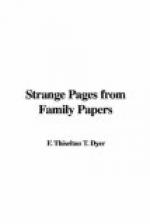The strange disappearance of Lady Cathcart, on the other hand, whose fourth husband was Hugh Maguire, an officer in the Hungarian service, is an extraordinary instance of a wife being, for a long term of years, imprisoned by her own husband without any chance of escape. It seems that, soon after her last marriage, she discovered that her husband had only made her his wife with the object of possessing himself of her property, and, alarmed at the idea of losing everything, she plaited some of her jewels in her hair and others in her petticoat. But she little anticipated what was in store for her, although she had already become suspicious of her husband’s intentions towards her. His plans, however, were soon executed; for one morning, under the pretence of taking her for a drive, he carried her away altogether: and when she suggested, after they had been driving some time, that they would be late for dinner, he coolly replied, “We do not dine to-day at Tewing, but at Chester, whither we are journeying.”
Some alarm was naturally caused, writes Sir Bernard Burke, “by her sudden disappearance, and an attorney was sent in pursuit with a writ of habeas corpus or ne exeat regno, who found the travellers at Chester, on their way to Ireland, and demanded a sight of Lady Cathcart. Colonel Maguire at once consented, but, knowing that the attorney had never seen his wife, he persuaded a woman to personate her.
The attorney, in due time, was introduced to the supposed Lady Cathcart, and was asked if she accompanied Colonel Maguire to Ireland of her own free will. “Perfectly so,” said the woman. Whereupon the attorney set out again for London, and the Colonel resumed his journey with Lady Cathcart to Ireland, where, on his arrival at his own house at Tempo, in Fermanagh, his wife was imprisoned for many years.” During this period the Colonel was visited by the neighbouring




